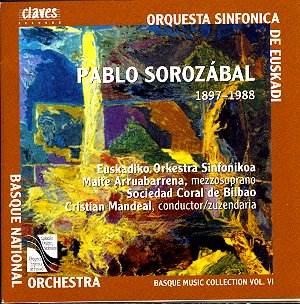Sorozábal was born in San Sebastian but moved to Madrid
to establish himself as composer as well as being a member of
the Philharmonic Orchestra. His 1920s were spent in Germany (with
summer holidays every year in San Sebastian) and many of the works
on this disc were written there - in fact in Leipzig where he
studied conducting with Hans Sitt and counterpoint with Stephan
Krehl. His 1930s and 1940s had him concentrating on stage works
including various zarzuela. After that his creativity moved back
to orchestral works.
Euskalleria is a version of the song he wrote in
1966, ¡Ay, tierra vasca!. It is squarely in the nationalistic
lyric cantata tradition with some disorientatingly Beethovenian
touches along the way. The Basque Suite also for
chorus and orchestra is quite varied with Verdian leading parts
for the woodwind, brilliant and playful Beethovenian episodes
and a lightness reminiscent of Tchaikovsky's Capriccio Italien.
The Kunkun movement has the women's choir singing very
quietly to magical effect. The choral tendency continues with
the late Gernika (1976) a work of public cortege
pomp. It does not stir or explore any depth of grief. The title
and subject refers to the town of Guernica slaughterously carpet
bombed by Hitler's Condor Legion Dorniers in Spain's 1930s Civil
War - a limbering up for the civilian death toll of Warsaw, Amsterdam,
Valetta, Coventry, Plymouth and London. The same tragedy also
prompted Picasso's cubist canvas and Escudero's musical piece
of the same name.
The Dos Apuntos Vascos is the first work on the
CD for orchestra alone. This is deeply attractive and refined
music in a subtly-shaded vein similar to Grieg (Holberg)
and Bridge (There is a Willow). The Seven Songs with
orchestra are delightfully done by Arruabarrena. Do not expect
the tang of De Falla or Nin or the subtlety and colouration of
Ravel. Instead these songs are touched with the playful wand of
zarzuela. Highlights include Lotoren lorak and the chattering
liveliness of Eres dagie txilibituek. The songs are to
Basque translations of one of Sorozabal's favourite poets, Heinrich
Heine, no doubt a taste picked up during his Leipzig years. Each
song is dedicated to a Basque friend. The Variaciones Sinfonicas
were regarded by the composer as of symphonic stature. Its theme
is the traditional melody Xoriñoa, norat boa. Frankly
I remain unconvinced of the composer's symphonic claims. The Variations
do however have some highly attractive touches including the subtle
impressionism of the Andante lamentabile (tr. 20) inevitably
reminiscent of the first of the Dos apuntos and the irresistibly
joyous Allegro scherzando with its feria role for
tambourine and Basque drums.
Claves and their stalwart sponsors deserve praise for their steadfast
commitment to this richly rewarding project, for their exalted
production values and for their perceptive choice of repertoire.
I hope that at some stage this will stretch to a disc of Basque
symphonies including Guridi's Sinfonia Pirenaica.
Another fascinating volume in the Basque series. Not the equal,
musically speaking, of the Isasi, Arrambari or Guridi discs but
with much attractive music to discover. Sample the highlights
(the first of the Apuntes, Kunkun, Lotoren Lorek
and Eres dagie txilibituek).
Rob Barnett
CLAVES BASQUE MUSIC SERIES
Guridi
CD 50-9709
Usandizaga
CD 50-9814
Arambarri CD 50-2001
Escudero CD 50-2110/2111
Isasi
CD 50-2007
see also review
by Chis Howell with a complete discography
